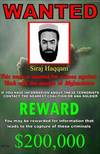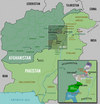The Taliban has launched yet another attack on a US outpost in Afghanistan from inside Pakistan. A Taliban rocket team fired at a US outpost in Paktika province in eastern Afghanistan early this morning from two sites: one within Afghanistan and another about 400 meters across the border in Pakistan. Four rockets struck near the military base, but no casualties were reported.
The military responded by attacking the two sites and notifying the Pakistani military of the attack. US forces lobbed artillery rounds at the launch sites in Pakistan and hit the site inside Afghanistan with fire from aircraft. No Taliban casualties were reported.
Today’s rocket attack is the second such strike launched from inside Pakistan reported this week. The Taliban fired rockets at a US base in Paktika on June 21. One Afghan woman and three children were killed in the attack.
The Taliban have launched a series of attacks against district centers and Afghan and Coalition forces in Paktika and neighboring Paktia province over the past week as part of an attempt to destabilize the eastern region and overrun Afghan government centers.
Twenty-two Taliban were killed after Afghan police repelled attacks on two district centers in Paktika province and one in Paktia province on the night of June 24. Earlier that same day, a large Taliban force made up of Afghan, Arab, and Chechen fighters attacked a district center in Paktia. Afghan and US forces killed 16 Taliban during the attack.
US and Afghan forces killed 55 Taliban and wounded another 25 during a massed attack on a patrol in neighboring Paktika province on June 20.
Further north, US forces engaged a Taliban force as it retreated from Afghanistan’s Kunar province across the border into Pakistan’s Mohmand tribal agency on June 10. The engagement sparked an international incident. The US confirmed it killed eight Taliban fighters, while the Pakistani government said 11 Pakistani troops were killed. The Pakistani government expressed outrage over the strike.
|
Pakistan, Afghanistan, and the tribal areas. Map from PBS’ Frontline. Click to view. |
Paktika and Paktia provinces border the Taliban-controlled tribal agencies of North and South Waziristan in Pakistan. The Taliban, led by Baituallah Mehsud in South Waziristan and the Haqqani family in North Waziristan, use the tribal agencies as bases to attack US and Afghan forces.
US forces have singled out the Haqqanis as a major threat in eastern Afghanistan. Siraj Haqqani is one of the most wanted men in the region because of his close links with Osama bin Laden and al Qaeda. He was behind the attack on the Serena hotel in Kabul in January.
US forces struck a Haqqani compound inside Pakistan with long-range artillery on March 12. Three unnamed high-level commanders in the Haqqani network were thought to be among those killed.
Several high-level commanders in the Haqqani network have been killed since last fall, including Mullah Sangeen, Siraj’s deputy; Abdul Manan; and Darim Sedgai.
Sedgai, formerly one of the 12 most wanted men in Afghanistan, was killed in Pakistan early this year. Manan was killed as he was infiltrating into Afghanistan’s Khost district from North Waziristan.
Just two days ago, Coalition forces captured a leader of the Haqqani network and three operatives in a raid in the Sar Hawza district in Paktika.
Taliban attacks in eastern Afghanistan have increased by 40 percent since last year, Major General Jeffrey Schloesser, the commander of Combined Joint Task Force-101, said during a briefing on June 24. While the attacks are “not really effective in lethality” they are “increasingly more complex.”
The strikes are originating in Pakistan, Schloesser said, noting that the “enemy’s taking refuge and operating with what I will call some freedom of movement in the border region, and they’re using this sanctuary to reconstitute, to plan and to launch attacks into Afghanistan.”










5 Comments
Any information on these rockets’ country of manufacture? I mean, they couldn’t possibly be Iranian! Pakistani?
Syed Saleem Shahzad makes several points in his latest article with which I agree, but this claim seems way over the top.
Asia Times: Islamabad blinks at Taliban threat
pakistan finally taking action aganist the taliban
Once Peshawar falls, americans will know the chickens have come to roost. Every one knows haqqani is ISI man except may be US !!!Hamid Gul must be laughing.
Its pretty obvious that Gul is a T-ban insider. How many photos of him sitting in on T-ban meetings does it take to convince an intel agent? The T-ban/AQ have it better now than they ever did in A-stan. The P-stani’s use that lame exuse of “sovereignty” when it suits them, while the T-ban governs Waziristan and other border areas. P-stan has been playing both sides for too long, and it may be time for the US, and the few Nato members to act without permission of the P-stani’s. There are 30+ camps running in W-stan, and they continually cross the border. The P-stani’s are only interested in saving thier own hides, and we pay out our nose to them. Its a DISGRACE. Find another way to keep the logistics train rolling, and bomb the camps, compounds and send troops across the border. There are air-assault troops in theatre, chopper them in and out, move them where the fight is. An insurgency can only survive if they have a “safe haven.” Make P-stan very unsafe for them, and don’t wait for the P-stani’s to do much at all. The former chief of the ISI at T-ban meetings…that pretty much says it all.